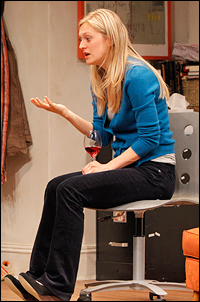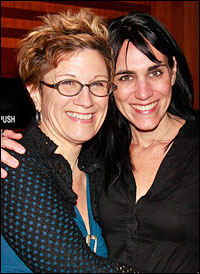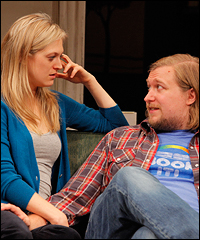
*
The common criticism that American playwrights tend to write about the personal, and not the political, is currently being strongly refuted by two pointedly topical plays running at the Public Theater, Lisa Kron's In the Wake and Richard Nelson's That Hopey Changey Thing. Both works also upend another piece of received wisdom, that most dramatists are blindly allegiant liberals. True, the characters in each drama are all Democrats, or at least Independents. But they're not feeling too good about it, or their political party. They attack and question their own rank and file as much as they do the GOP.
"When I was a kid," said Kron, speaking about what drew her to write In the Wake, which takes place during the first five years of the Bush administration, primarily in New York City, "I grew up in a family of Democrats who were politically active on a local level, as I wrote about in Well. I remember having a feeling of 'Wow, we feel such assurance that what we feel is correct.' But the people on the other side must feel that as well."
That sort of self-questioning and political uncertainty besets most of the characters in In the Wake, save the central figure of Ellen, a hyper-energized chatterbox who is rarely less-than-engaged with her life and the reigning political climate. She doesn't edit her thoughts on the big issues of the day, and woe betide anyone who doesn't necessarily want to hear her stance on current events — or happens to diverge slightly from any of Ellen's opinions. When her friend suggests she might actually want to give up her career as a struggling writer to be an office manager, Ellen gives her the name of another publisher. When her friend's girlfriend says her politics shifted at 9/11, Ellen subtly derides her reaction as "regular fear."
| |
 |
|
| Marin Ireland as Ellen | ||
| photo by Joan Marcus |
"Ellen has the notion of expansiveness," said Kron. "That character is not particularly interested in an easy life. She's a character who is willing to pay the price for self-invention. She's commenting on the country and the political events of those years and she's also meant to be an allegory for the country. There are things she thinks about herself that are true. I think she is interested in deepening her experience, and she does take responsibility for what she does, and she does have this desire for this kind of expansive experience of her life. But what she cannot imagine is loss. What she doesn't understand is the kind of deepening she is interested in also involves loss and sacrifice and that is visited upon her in the end."
| |
 |
|
| Kron and director Leigh Silverman | ||
| photo by Joseph Marzullo/WENN |
Interestingly, Kron said one line she removed from the play had Ellen say to the audience, "When people say they want change, what they mean is 'I want you to change.'"
"I'm not interested in saying the United States is corrupt and therefore should go down," said Kron. "There is a worthy and huge and ambitious and expansive idea at the center of this country. But, I think in all my plays, I'm interested in the idea that everything contains its opposite. The country is that, but it's also the opposite. Certainly right now, the painful paralysis and contraction, all the things that are happening that are so scary, have to do with the absolute inability to comprehend that there must be sacrifices across the board and there will be loss."
Such a notion, Kron said, is not part of the American persona, either conservative or liberal. Near the end of the play, a suffering Ellen asks her friend Judy — an older and more cynical woman who participates in relief and aid programs across the world, and who has no faith whatsoever in the justice of the American system — how much further she has to fall before she hits bottom. The unsympathetic Judy replies, "I'm sorry, but that's an American question."
| |
 |
|
| Marin Ireland and Michael Chernus in In the Wake | ||
| photo by Joan Marcus |
The play is the first of Kron's not to feature herself, playing herself. This has made the production a different experience for the writer. "The show doesn't travel through my body the way it used to." It's also her longest play, running more than two-and-a-half hours. But Kron doesn't consider it overly lengthy. "I figure with Gatz playing over on the other side of the theatre, it's like, 'Hey, come over here and see the short play!'"










